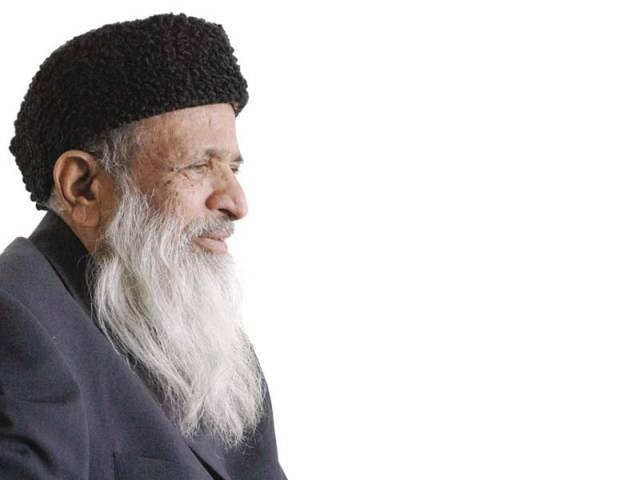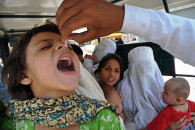Abdul Sattar Edhi – our own Abou Ben Adhem
He devoted more than sixty years for helping the poorest of the poor

He devoted more than sixty years for helping the poorest of the poor.
Awoke one night from a deep dream of peace,
And saw—within the moonlight in his room,
Making it rich and like a lily in bloom—
An angel, writing in a book of gold.
Exceeding peace had made Ben Adhem bold,
And to the presence in the room he said,
‘What writest thou?’—The vision raised its head,
And, with a look made of all sweet accord,
Answered, ‘The names of those who love the Lord.’
‘And is mine one?’ said Abou. ‘Nay, not so,’
Replied the angel. Abou spoke more low,
But cheerly still, and said, ‘I pray thee, then,
Write me as one that loves his fellow men.’
The angel wrote and vanished. The next night
It came again with a great wakening light,
And showed the names whom love of God had blessed,
And lo! Ben Adhem’s name led all the rest.
Abdul Sattar Edhi was our Abou Ben Adhem.
For more than loving and worshipping God, the country’s greatest humanitarian, loved God’s creations –human beings.
Edhi is a man who devoted more than 60 years of his life to sleepless nights and stale bread breakfasts, helping the poorest of the poor. He bathed mentally challenged, picked up the rotten, buried the abandoned, and reached out to victims of natural calamities, violence and disaster.
A national hero, his cause was beyond creed and castes, religion and race. He was there for the white and the black, for the fanatic and for the atheist, for the pious and the sinner; every human being was equal in his eyes.
Today, he is no more.
In the 1970s, rumours about Abdul Sattar Edhi’s death spread like wild fire. “Edhi is dead,” cried the mourners as they pulled down their shops and wailing women came out on the streets, beating their chests. Everyone was in shock and disbelief, hearing that his ambulance in Iqbalabad, Punjab, had overturned.
But God had other plans for Edhi.
In the hospital where Edhi had survived in a critical condition, his subconscious kept on cursing him. As Edhi came around, tears rolled from his eyes.
God had punished him because he had slapped a physically-challenged girl in a bid to stop her from leaving the shelter home. Every time she would go on the streets, she would get raped.
Abdul Sattar Edhi passes away in Karachi
For Edhi, this incident was a life changer. He never lifted his hand on anyone again. And there was no looking back for him again.
That new lease of life gave Edhi the inspiration to expand his humanitarian services to every nook and corner of the country and eventually worldwide.
That was how the country’s great humanitarian, philanthropist, social activist spent his life. His passion for helping mankind inspired thousands to follow his lead.
Skinned darkened by the sun, broad shoulders weakened by the workload, his white-bearded face never lost his humble smile.
There would never be a trace of how exhausted he would become after giving bathes to hundreds of dead bodies. He would never shiver when being amidst hardened criminals to pick up victims’ bodies. Edhi was a man made of steel and a heart out of gold. He belonged to all of us.
The little shoulders on which rests the biggest welfare empire in the world
His life
Edhi was born in 1928 in a small village Bantva in Gujrat, India. Belonging to a Memon family, the habit of helping the poor was instilled by his mother. When he was a child, she would hand out two paisas to him every day, making sure that he spent one paisa on deserving people.
The richest poor man
When Edhi failed to do that, she would taunt him by saying that she saw the greed in his eyes, and hence he would hunt for the deserving person and would help him out.
Edhi was never interested in formal education.
After partition, when the family moved to Karachi, he started his own business of selling match boxes, then a paan shop and eventually followed his father’s footstep of becoming a commissioner agent.
But the passion of voluntary work stayed alive in his blood. In 1951, in Mithadar he bought a small shop and set up a dispensary to aid the poor. That was his beginning.
Edhi Foundation
Though Edhi’s charity work had started very early, it was in 1974 that a formal institution by the name of Edhi Foundation was set up. What the foundation is today, and how it is depended on the shoulders of this single man is no less than a miracle.
What started off as an eight feet dispensary in Mithadar transformed into the country’s largest charitable organisation, comprising mobile dispensaries, ambulances, orphanages, shelter homes, animal hostel, maternity homes, morgues and graveyards.
Today, there are 335 centres with 1,800 ambulances in the country, hundreds of volunteers and thousands dependent on him for their free food, water, medicines and shelter. His centres are abroad too, in the US, Canada, Afghanistan, Nepal and the Middle East.
Unlike, charitable organisations’ bosses who sit in air-conditioned rooms, never go out in the field and simply order their employees to work, this man set the biggest and greatest example of a social activist.
After morning prayers, he would set off to his modest office in a narrow lane of Mithadar and sit with his daughters to attend calls for donations and take in women, children and men who had no place to go. Edhi never said no to anyone.
Greenshirts to sport ‘Edhi’ during England tour
He would visit his centres, picking up abandoned children, feed those who had no arms, wash those who could not think right, hug those who had no one in their lives, and bandage those who were injured.
He maintained the finances himself, making sure that every penny was spent carefully. Habits of his childhood, when he would loathe spending and loved saving, carried on till the end.
World’s largest ambulance service
When Edhi bought his first vehicle, an old Hillman van, he spent hours polishing and washing it, before painting ‘Poor Man’s Van’ on both sides. That poor van indeed became his prized possession, as he sped it across the city to rescue people from drains, fallen buildings and where help was needed.
His dream was to use a speedy vehicle to bring the injured to the hospital to save his life. Today Edhi’s ambulance service is the largest service in the world. His white coloured and blaring horn ambulances roam around the city, reaching out to the needy in just minutes.
Edhi as the savior
For Edhi, humanity was above everything. His philosophy was ‘love human being, serve the humanity’. He believed that no religion was higher than humanity. And that is why Edhi became the saviour.
When people would turn away from dead bodies, would gawk or move away from the stench, only this man dared to pick the bodies up from manholes and gutters. He even picked minced bodies such as one he picked up from New Karachi.
From aiding refugees in Afghanistan during Soviet invasion to reaching out to famine victims to Ethiopia, Edhi has been at the scene of every major natural or man-made disaster or war in the last several decades. If not him in person, then his things such as tents, ration or ambulances reach out.
Charitable organisation
It won’t be wrong to say that it was because of this man that the charity actually started in the country. The first time Edhi collected money for his small dispensary ended up in collecting Rs20,000.
Pakistanis are said to be the most charitable nation, and Edhi has his hand behind him. He has been across the globe to collect chanda, and has come out in sweltering heat to collect bheeg.
Even in his last days, sitting in his wheel chair, he would ask for donations carrying a black box. Passersby would drop anything they had. Even a single rupee would be met with a courteous smile from Edhi.
For most of the charitable organisations, Ramzan was the most successful month. But not for Edhi Foundation. Here charity would be received every day in the form of cash, clothes, ration and other necessities. For a long time, Edhi had refused to take charity from government organisations or from non-Pakistanis.
Edhi as a man
Edhi was humble. Edhi was simple. Edhi was straightforward.
Although Edhi had started off his childhood, playing gali danda with boys, watching his movie ‘Pukaar’ in the cinema, bunking around school and later becoming a class monitor, the playful traits died very much early in his life. Later, it was all about saving others.
When he got married, he left his new bride to cater to emergency services, and gave only Rs250 as wedding gift. He refused to wear new clothes on his wedding.
Important dignitaries or Hollywood actors meant nothing to him. He would wear the same clothes in front of everyone, be it Sean Penn or Indonesian president.
DHA renames road to honour Edhi
Once when US ambassador Cameron Munter was supposed to visit his home, he remarked, “Why do they want to visit me? It will do no good to me, instead the security checks have made our live hell.” But when the ambassador came, Edhi was his usual self.
Edhi was a man of strong principles. Yes, he was a follower of Islam but was against extremists and preaching mullahs. Edhi had read about Marxism and Lenin when he was only thirteen.
He would dislike going to social engagements as he believed it wasted time, but would attend mass marriages of Hindus every year in a bid to show his love for people belonging to other faiths.
He felt no shame in calling himself poor when he would get millions in donations. He felt no qualm in ‘begging’ on streets for charity.
His family
Edhi is survived by his wife Bilquis, and four children. Although Edhi had been a very different father, looking more after the dead than his children, his love was the same for them and the passion for charitable work was carried on by his family.
He loved his mother and performed all tasks for her after she become bedridden. His mother was his inspiration for charity work. Once his father remarked to others, “I have donated a whole human being to charity – watch him.”
He got married in 1966 to a 16-year-old trainee nurse, Bilquise, but his simple lifestyle did not change.
He would never take his family for picnics or to parks. His wife and children would cry for shoes, clothes, car and house but he would scold them and tell them to look to people, who did not have these privileges.
His biography narrates that Edhi was shaken up by the death of his four year old son grandson Bilal. Bilal was burnt to death by a mentally unstable woman at the shelter home, but Edhi forgave that woman.
International recognition
In November 2011, the humanitarian was selected for the Nobel Peace Prize by the president.
The first award to come for Edhi was sadly not from Pakistan but a Ramon Magsaysay Award for public service from Philippines in 1986. In Pakistan, he was awarded the Nishan-e-Imtiaz in 1989.
In 2000, the Guinness book of world record said that he owned the largest voluntary ambulance organisation of the world.
References: A mirror to the Blind (Abdul Sattar Edhi official biography)- Tehmina Durrani



















COMMENTS
Comments are moderated and generally will be posted if they are on-topic and not abusive.
For more information, please see our Comments FAQ